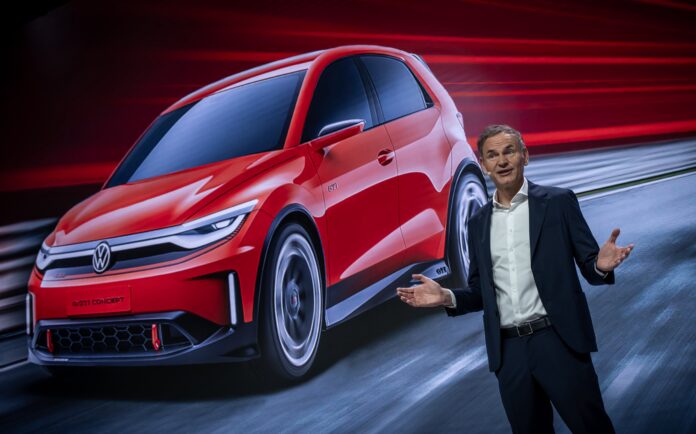Car manufacturer Volkswagen (VW) is no longer ruling out plant closures and compulsory redundancies in Germany as part of its cost-cutting programme at the core VW brand, the company announced on Monday.
Management at VW said it would be cancelling a longstanding agreement with labour in Germany that ruled out compulsory redundancies through the end of 2029.
The deal has been in place since 1994.
The company said that executives believe the VW brand must be comprehensively restructured and current efforts to reduce the workforce through earlier retirement packages and voluntary severance payments would not be enough to meet savings targets.
“Even closures of vehicle production and component plants can no longer be ruled out in the current situation without rapid countermeasures,” VW announced.
Labour leaders at VW said they would wage an all-out battle against the plans.
In a special edition of the works council’s newspaper, Mitbestimmen, which DPA was able to obtain, Daniela Cavallo, the head of the VW works council, called the plans “an attack on our employment, workplaces, and collective bargaining agreements”.
We will defend ourselves
“This puts VW itself and therefore the heart of the [Volkswagen] group in question. We will fiercely defend ourselves against this,” Cavallo wrote to workers.
“With me, there will be no VW site closures.”
The company said in April that it was expecting the next two years in the highly competitive Chinese car market to be difficult.
“In April, we saw another round of price reductions coming, so this fierce competition will hold on for the next few years,” VW board member Ralf Brandstätter said in Beijing.
Many manufacturers of purely electric cars have significantly damaged their profit margins in recent years, he said, “so this leads to a consolidation of the market”.
He suggested that companies with lower sales volumes, below 100 000 or 150 000 vehicles per year, would not survive the coming competition.
According to Brandstätter, Volkswagen plans to prepare for fierce price competition over the next two years and finance the development of its e-car business in China with sales of combustion-engine vehicles, which are still going well.
“This means for us two heavy years because we will not make each volume for any price,” Brandstätter said.
Losing market share
He added that the company may have to accept lower sales figures in order to maintain pricing, which will likely mean losing market share in the short term.
Volkswagen plans to be back on a par with the competition in China in terms of costs and technology beginning in 2026 for entry-level compact cars, he said.
The costs of the vehicle platforms developed for China are to be reduced by 40%, he said.
By 2030, the Volkswagen Group, which also includes brands such as Audi and Porsche as well as Volkswagen, aims to have sold about 4-million vehicles in China, with half of all cars sold electrically powered.
According to VW, this would correspond to a market share of 15%.
In March, financial results showed that the German car-making giant recorded increased profits last year, benefiting from improvements in day-to-day business, the company said.
Profit after tax rose from €15.8-billion (R311-billion) in the previous year to €17.9-billion, as the DAX-listed company announced in Berlin.
This represents an increase of about 13%.
Return on sales
Europe’s largest car manufacturer had already presented the majority of its figures at the beginning of March.
Thanks to a 12% increase in deliveries, turnover climbed at a rate of 15.5% to €322.3-billion.
The group, with its core brands VW, Skoda, Seat and VW Commercial Vehicles, increased its return on sales from 3.6% to 5.3%, which was mainly due to the increase in sales, it said.
The business with the mass brands is not as profitable as chief executive Oliver Blume would like, which is why a multi-billion euro savings programme with job cuts is underway in this area.
By contrast, the group around the Audi car brand would have achieved a better margin in 2023 only without the costs of hedging raw materials. – dpa



